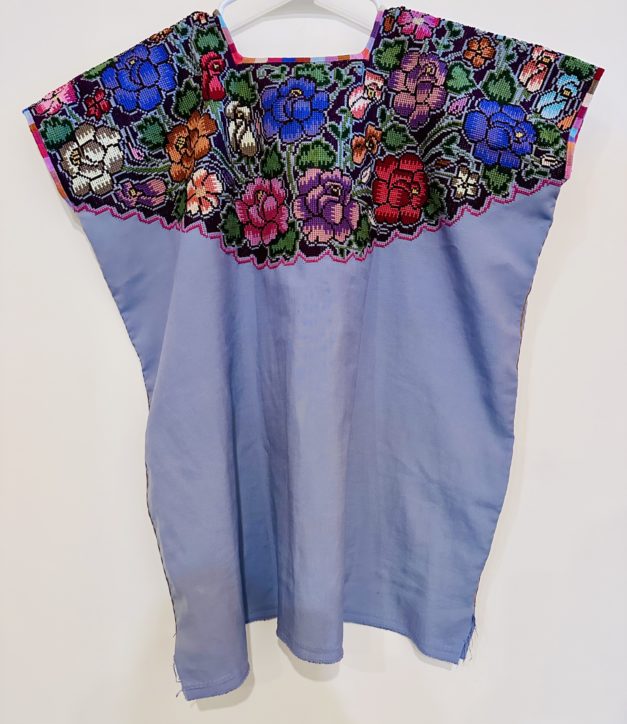In March 2022, I had the good fortune to meet the weavers of the Maya cooperative Tsobol Antsetik (Women United) where they live and work in the township of Chixilton, Chenalho, Chiapas, on International Women’s Day. The group was formed over two decades ago and has 25 members. They use the back strap loom to weave for personal use and to sell, when they can. This is so important because without this work to sustain their life on ancestral lands, they would be forced to migrate to other parts of Mexico or the USA for employment. Besides weaving, they help husbands and sons to grow corn and beans and coffee.

I went through the auspices of Weaving for Justice, a Las Cruces, New Mexico not-for-profit founded by Christine Eber, Ph.D., an anthropologist who teaches at New Mexico State University. This is an organization that knows no boundaries. Members are from throughout the USA, Canada and worldwide. Flora Graham and Sheryl Williams, both members, who were participants on our Chiapas Textile Tour, arranged the visit.





To get there is easy … and not. Chenalho is a mountain town about an hour from the hustle bustle of San Cristobal del las Casas. We find the designated colectivo taxi garage on a commercial street beyond Santo Domingo Church, deep in the indigenous market that encompasses many city blocks. The streets are packed with tianguis, the temporary tents where informal vendors sell fruit, vegetables, housewares, brassieres, infant clothing, and occasional handcrafts. After paying the fare of 200 pesos for five of us, we make out way out of the valley and up the winding road.



Curves and switchbacks take us through terraced fields where spring corn has not yet been planted. on one side of the road, fern-filled rock walls send forth rivulets of water cascading down the hill. On the other side, a sheer drop off gives us views of lush green fields where giant round winter squash are ready for harvest. Sheep, goats and cows graze. Bromeliads cling to tree branches. A curl of smoke in the distance is either from a field being cleared (slash and burn agriculture) or a cooking fire. Humble wood dwellings dot the landscape. As we get closer to town, we begin to see women wearing their traje (indigenous garments) as they sweep porches or tend to children and livestock. A lonely painted wood road sign offers gasoline for sale at the neighborhood convenience store around the bend.
I’ve always admired the back-strap loomed striped cotton cloth of Chenalho, typically embroidered or woven using the supplementary weft technique on the bodice with symbols central to life on the highlands, central to dreams and mythologies: stars, a crescent moon, corn stalks, field furrows, strawberries, turtles, butterflies, hearts, spiders, grapes, dog paws, the heads of caterpillars and fish bones. A design called five spines is most emblematic of the village.
Years ago, during my first visit to Chiapas, I found this incredible weaving and embroidery in the artisan market in front of Santo Domingo Church. Today, there are few pieces to be found. It’s been a dream to go to the village, but I never managed it until March 2022. Here, I found a creative, dedicated and energetic group of women of all ages, dedicated to preserving their textile traditions.


Christine Eber writes, “Since the 1990’s, young women have been inventing new designs that include animals, insects, plants and fruits. They embroider these designs on their blouses and some put them on their skirts.” As time progressed, more shiny, synthetic threads were incorporated into the embroidery in addition to cotton. As these threads became more available, there was a move away from using wool which produced a bulky embroidery that wasn’t as fine.
We are adding a visit to Chenalho on our 2023 Chiapas Textile Tour. There are four spaces open. Come with us for a textile adventure of a lifetime!
Our tours are always off-the-beaten path, exploring the best textiles, meeting with makers.


Weaving for Justice provides support through Sophie’s Circle, the 501(C)3 that accepts tax-deductible donations and offers books and clothing for sale to support the women and their families.
Our tours are aligned with Weaving for Justice values: We ensure that producers receive fair prices and their values, goals and needs guide the fair trade process. We never bargain. It takes hours and months to make these garments. We support providing equal employment opportunities for all people, particularly the most disadvantaged. By bringing visitors to remote villages, we offer opportunities for creativity and individual recognition. We support providing healthy and safe working conditions within the local context. We respect cultural traditions, do not judge another way of life nor compare it to our own. We value reciprocity and respect. We have been bringing groups of textile lovers to Chiapas for many years and we are committed to building long-term relationships, to autonomy and human rights.

























